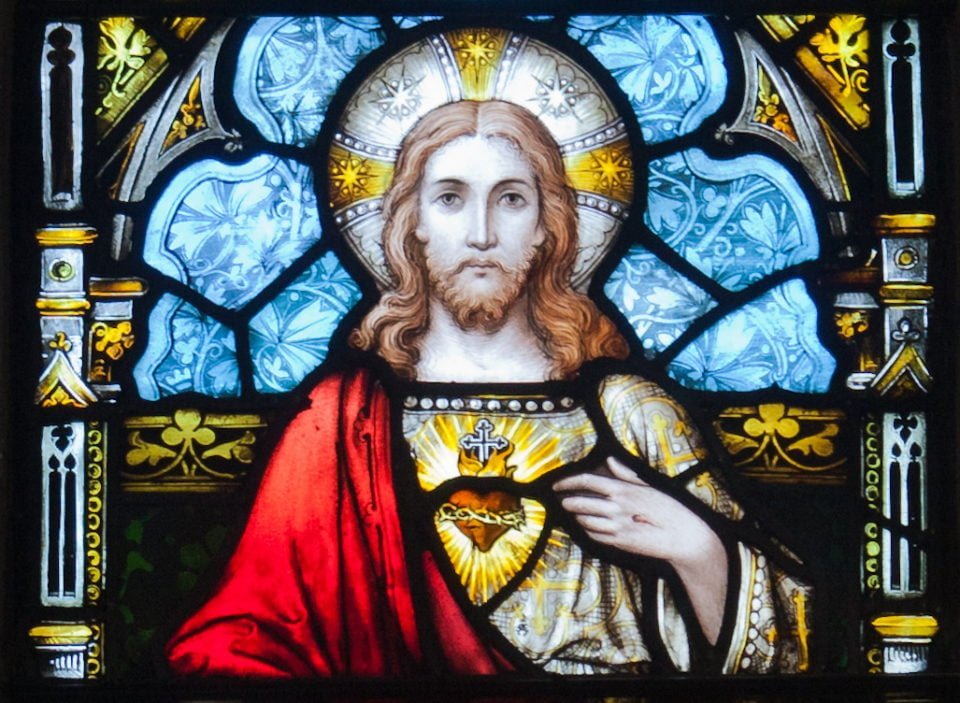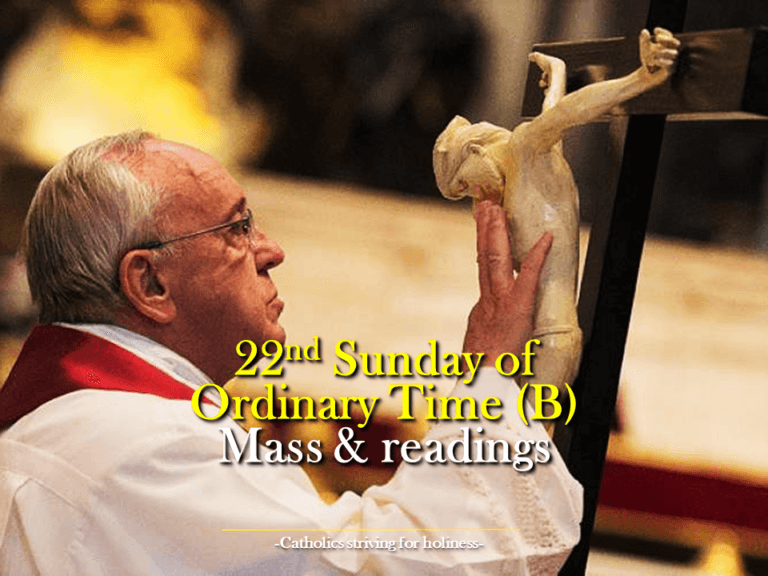POPE FRANCIS’ REFLECTION 22ND SUNDAY IN ORDINARY TIME YEAR B

ANGELUS
Saint Peter’s Square
Sunday, 1st September 2024
________________________________________
Dear brothers and sisters, happy Sunday!
Today, in the Gospel of the liturgy (cf. Mk 7:1-8, 14-15, 21-23), Jesus speaks about the pure and the impure: a matter very dear to his contemporaries, which was linked principally to the observance of rites and rules of behaviour, to avoid any contact with things or persons considered unclean and, if this happened, to erase the “stain” (cf. Lev 11-15). Purity and impurity were almost an obsession for some religious of those times.
Some scribes and Pharisees, obsessive, strict observers of such norms, accuse Jesus of allowing his disciples to eat with unwashed hands, without washing their hands. And Jesus takes this reproach on the part of the Pharisees to His disciples to talk to us about the meaning of “purity”.
Purity, Jesus says, is not linked to external rites, but is first and foremost linked to inner dispositions, interior dispositions. To be pure, therefore, it is no use washing one’s hands several times if one then, within the heart, harbours evil feelings such as greed, envy or pride, or evil intentions such as deceit, theft, betrayal and slander (cf. Mk 7:21-22). Jesus draws attention to the need to beware of ritualism, which does not make one grow in goodness; on the contrary, this ritualism can sometimes lead one to neglect, or even justify, in oneself and in others, choices and attitudes contrary to charity, which wound the soul and close the heart.
And this, brothers and sisters, is important for us too: one cannot, for example, leave Holy Mass and, still in front of the church, stop and gossip wickedly and mercilessly about everything and everyone. That chatter that ruins the heart, that ruins the soul. And you can’t do this! If you go to Mass and then do these things at the entrance, it is a bad thing! Or to show oneself to be pious in prayer, but then treat one’s own relatives at home with coldness and detachment, or neglect their elderly parents, who are in need of help and company (cf. Mk 7:10-13). This is a double life, and one cannot do this. And this is what the Pharisees did. External purity, without good attitudes, merciful attitudes towards others. One cannot be apparently very decent to everyone, and perhaps even do a bit of voluntary work and some philanthropic gestures, but then inwardly cultivate hatred towards others, despise the poor and the least, or behave dishonestly in one’s work.
In acting in this way, the relationship with God is reduced to external gestures, and within one remains impervious to the purifying action of His grace, indulging in thoughts, messages and behaviour without love. We are made for something else. We are made for the purity of life, for tenderness, for love.
Let us ask ourselves, then: do I live my faith in a consistent manner, that is, what I do in Church, do I try to do outside in the same spirit? By my sentiments, words and deeds, do I make what I say in prayer tangible in closeness and respect for my brothers and sisters? Let us think about this.
And may Mary, Mother most pure, help us to make our life, in heartfelt and practiced love, worship pleasing to God (cf. Rm 12:1).
Source: https://www.vatican.va/content/francesco/en/angelus/2024/documents/20240901-angelus.html
EMPHASIS MINE.

ANGELUS
Saint Peter’s Square
Sunday, 29 August 2021
_______________________________
Dear Brothers and Sisters, Buongiorno!
The Gospel for today’s liturgy shows a few scribes and Pharisees amazed by Jesus’ attitude. They are scandalized because his disciples pick up food without first performing the traditional ritual ablutions. They think among themselves “This way of doing things is contrary to the religious practice” (cf. Mk 7:2-5).
We too can ask ourselves: why do Jesus and his disciples disregard these traditions? After all, they are not bad things, but good ritual habits, simple washings before eating. Why doesn’t Jesus attend to it? Because for Him it is important to bring faith back to its centre. In the Gospel we see it repeatedly: this bringing faith back to the centre. And to avoid a risk, which applies to those scribes as well as to us: to observe outward formalities, putting the heart and the faith in the background. Many times we too “put makeup” on our soul. Outward formality and not the heart of faith: this is a risk. It is the risk of a religiosity of appearances: looking good on the outside, while failing to purify the heart. There is always the temptation to “organize God” with some outward devotion, but Jesus does not settle for this worship. Jesus does not want outward appearances, he wants a faith that touches the heart.
In fact, immediately afterwards, he calls the people back to speak a great truth: “there is nothing outside a man which by going into him can defile him; but the things which come out of a man are what defile him” (v. 15). Rather, it is “from within, out of the heart” (v. 21) that evil things are born. These words are revolutionary, because in the mindset of the time it was thought that certain foods or external contacts would render one impure. Jesus reverses the perspective: what comes from the outside does not do harm, but rather, what is born from within.
Dear brothers and sisters, this also pertains to us. We often think that evil comes mainly from the outside: from other people’s conduct, from those who think badly of us, from society. How often we blame others, society, the world, for everything that happens to us! It is always the fault of “others”: it is the fault of people, of those who govern, of misfortune, and so on. It seems that problems always come from the outside. And we spend time assigning blame; but spending time blaming others is wasting time. We become angry, bitter and keep God away from our heart. Like those people in the Gospel, who complain, who are scandalized, who cause controversy and do not accept Jesus. One cannot be truly religious in complaining: complaining poisons, it leads you to anger, to resentment and to sadness, that of the heart, which closes the door to God.
Today let us ask the Lord to free us from blaming others – like children: “No, it wasn’t me! It’s the other one, the other one…”. Let us ask in prayer for the grace not to waste time polluting the world with complaints, because this is not Christian. Jesus instead invites us to look at life and the world starting from our heart. If we look inside, we will find almost all that we despise outside. And if, sincerely, we ask God to purify our heart, that is when we will start making the world cleaner. Because there is an infallible way to defeat evil: by starting to conquer it within yourself. The first Fathers of the Church, the monks, when they were asked: “What is the path of holiness?”, the first step, they used to say, was to blame yourself: blame yourself. Blaming ourselves. How many of us, during the day, in a moment during the day or a moment during the week, area able to blame ourselves within? “Yes, this on did this to me, the other one … that is barbarity…”. But me? I do the same thing, or I do it this way…. It is wisdom: learning to blame yourself. Try to do it, it will do you good. It does me good, when I manage to do so, but it is good for us, it everyone good.
May the Virgin Mary, who changed history through the purity of her heart, help us to purify our own, by overcoming first and foremost the vice of blaming others and complaining about everything.
SOURCE: VATICAN.VA FORMATTING MINE.
__________________________________

ANGELUS
Saint Peter’s Square
Sunday, 2 September 2018
Dear Brothers and Sisters, Good morning!
This Sunday we turn to a reading from the Gospel of Mark. In today’s passage (cf. Mk 7:1-8, 14-15, 21-23), Jesus addresses an important topic for all of us believers: the authenticity of our obedience to the Word of God, against any worldly contamination or legalistic formalism. The narrative opens with the objection that the scribes and Pharisees address to Jesus, accusing his disciples of failing to observe the ritual precepts according to tradition. In this way, those challenging him seek to strike at the reliability and authority of Jesus as Teacher because they say: “But this teacher allows his disciples to evade the prescriptions of tradition”. But Jesus responds emphatically; he responds by saying: “Well did Isaiah prophesy of you hypocrites, as it is written, ‘This people honours me with their lips, but their heart is far from me; in vain do they worship me, teaching as doctrines the precepts of men’” (vv. 6-7). This is what Jesus says. Clear and emphatic words! ‘Hypocrite’ is, so to speak, one of the strongest adjectives that Jesus uses in the Gospel, and he speaks them as he addresses the teachers of religion: doctors of the law, scribes…. ‘Hypocrite’, Jesus says.
Indeed, Jesus wants to rouse the scribes and Pharisees from the error they have fallen into, and what is this error? That of distorting God’s will, neglecting his commandments in order to observe human traditions. Jesus’ reaction is severe because something great is at stake: it concerns the truth of the relationship between man and God, the authenticity of religious life. A hypocrite is a liar; he is not authentic.
Today too, the Lord invites us to avoid the danger of giving more importance to form than to substance. He calls us to recognize, ever anew, what is the true core of the experience of faith, that is, love of God and love of neighbour, by purifying it of the hypocrisy of legalism and ritualism.
Today’s Gospel message is also reinforced by the voice of the Apostle James, who tells us, in brief, what true religion is meant to be, and he says: pure religion is “to visit orphans and widows in their affliction, and to keep oneself unstained from the world” (Jas 1:27). “To visit orphans and widows” means to practice charity toward neighbours, beginning with the neediest, frailest, most marginalized people. They are the people whom God takes care of in a special way, and he asks us to do the same.
“To keep oneself unstained from the world” does not mean to isolate oneself and close oneself off from reality. No. Here too there must be not an exterior attitude, but interior, substantive: it means being vigilant so that our way of thinking and acting may not be polluted by the worldly mentality, or that of vanity, of greed, of arrogance. Actually, a man or woman who lives in vanity, in greed or in arrogance and at the same time believes and shows him or herself as being religious and even goes so far as to condemn others, is a hypocrite.
Let us make an examination of conscience to see how we embrace the Word of God. On Sunday we listen to it at Mass. If we listen to it in a distracted or superficial way, it will not be of much use. Instead, we must welcome the Word with open minds and hearts, as good soil, in a way that it may be assimilated and may bear fruit in real life. Jesus says that the Word of God is like wheat; it is a seed that must grow in practical deeds. In this way the Word itself purifies our heart and actions, and our relationship with God and with others is freed from hypocrisy.
May the example and intercession of the Virgin Mary help us to always honour the Lord with our heart, witnessing to our love for him in concrete choices for the good of our brothers and sisters.
Source: https://www.vatican.va/content/francesco/en/angelus/2018/documents/papa-francesco_angelus_20180902.html

ANGELUS
Saint Peter’s Square
Sunday, 30 August 2015
Dear Brothers and Sisters, Good morning!
The Gospel for this Sunday concerns a dispute between Jesus and several Pharisees and scribes. The discussion is about the value of the “tradition of the elders” (Mk 7:3) which Jesus, quoting the Prophet Isaiah, defines as the “precepts of men” (v. 7) which must never take precedence over the “commandment of God” (v. 8). The ancient rules in question consisted not only in the precepts God revealed to Moses, but in a series of norms that the Mosaic Law indicated. The interlocutors observed these norms in an extremely scrupulous manner and presented them as the expression of authentic religiosity. Therefore, they rebuked Jesus and his disciples for transgressing them, specifically the norms regarding the external purification of the body (cf. v. 5). Jesus’ response has the force of a prophetic pronouncement: “You leave the commandment of God”, he says, “and hold fast the tradition of men” (v. 8). These are words which fill us with admiration for our Teacher: we sense that in him there is truth and that his wisdom frees us from prejudice.
Pay heed! With these words, Jesus wants to caution us too, today, against the belief that outward observance of the law is enough to make us good Christians. Dangerous as it was then for the Pharisees, so too is it for us to consider ourselves acceptable or, even worse, better than others simply for observing the rules, customs, even though we do not love our neighbour, we are hard of heart, we are arrogant and proud. Literal observance of the precepts is a fruitless exercise which does not change the heart and turn into practical behaviour: opening oneself to meet God and his Word in prayer, seeking justice and peace, taking care of the poor, the weak, the downtrodden. We all know, in our communities, in our parishes, in our neighbourhoods, how much harm and scandal is done to the Church by those people who say they are deeply Catholic and often go to Church, but who then neglect their family in daily life, speak badly of others and so on. This is what Jesus condemns because this is a counter-witness to Christianity.
After his exhortation, Jesus focuses attention on a deeper aspect and states: “there is nothing outside a man which by going into him can defile him; but the things which come out of a man are what defile him” (v. 15). In this way he emphasizes the primacy of interiority, that is, the primacy of the “heart”: it is not the external things that make us holy or unholy, but the heart which expresses our intentions, our choices and the will to do all for the love of God. External behaviour is the result of what we decide in the heart, and not the contrary: with a change in external behaviour, but not a change of heart, we are not true Christians. The boundary between good and evil does not pass outside of us, but rather within us. We could ask ourselves: where is my heart? Jesus said: “Where your treasure is, there will your heart be also”. What is my treasure? Is it Jesus, is it his teaching? If so, then the heart is good. Or is my treasure something else? Thus it is a heart which needs purification and conversion. Without a purified heart, one cannot have truly clean hands and lips which speak sincere words of love — it is all duplicitous, a double life — lips which speak words of mercy, of forgiveness: only a sincere and purified heart can do this
Let us ask the Lord, through the intercession of the Blessed Virgin, to give us a pure heart, free of all hypocrisy. This is the word that Jesus uses for the Pharisees: “hypocrites”, because they say one thing and do another. A heart free from all hypocrisy, thus we will be able to live according to the spirit of the law and accomplish its aim, which is love.
Source: https://www.vatican.va/content/francesco/en/angelus/2015/documents/papa-francesco_angelus_20150830.html
EMPHASIS MINE
Copyright © Dicastero per la Comunicazione – Libreria Editrice Vaticana
Stay updated: subscribe by email for free TO OUR NEW WEBSITE www.catholicsstrivingforholiness.org (PUT YOUR EMAIL IN THE SUBSCRIBE WIDGET).
We are also in www.fb.com/Catholicsstrivingforholiness. Kindly help more people in their Christian life by liking our page and inviting your family, friends and relatives to do so as well. Thanks in advance and God bless you and your loved ones! Fr. Rolly Arjonillo

